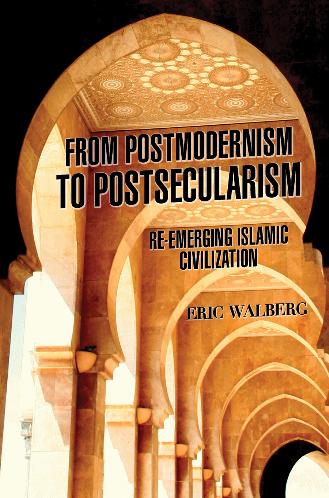www.aljazeerah.info
Opinion Editorials, June 2013
Archives
Mission & Name
Conflict Terminology
Editorials
Gaza Holocaust
Gulf War
Isdood
Islam
News
News Photos
Opinion Editorials
US Foreign Policy (Dr. El-Najjar's Articles)
www.aljazeerah.info
Re-Emerging Islamic Civilization:
From Postmodernism to Post Secularism
a New Book By Eric Walberg
Al-Jazeerah, CCUN, July 22, 2013
|
FROM POSTMODERNISM TO POSTSECULARISM Re-Emerging Islamic Civilization by Eric Walberg
ISBN: 978-0-9853353-8-0 $26.95 2013 369 pp. |
|||||||||
|
The Arab Spring is really an Islamic one and the logical result of a century and a half of imperialist intrigues to incorporate the Middle East and Central Asia into the imperial project.
How did this come about? What are the chances of the Muslim world
asserting an independent position in the face of American empire and
the rising non-imperial world bloc, BRICS? All the monotheisms have a linear concept of time/ history, which in the case of Christianity/ Judaism led logically to capitalism, Marx and the communist apocalypse. The Islamic project contains its own socio-economic solution which prevented the rise of capitalism/ imperialism, making it the loser in the technology race of the 19th-20th centuries. Walberg
provides an overview of imperialism and colonialism in the Muslim
world, recapping his thesis in
Postmodern Imperialism
of the historical movement in the first “great Games” (ex-Ottoman
Levant and Raj/ Afghanistan/ Iran under British empire ) through the
second and third (colour revolutions vs revival of Islamic vision of
Caliphate to replace imperialism).
View synopsis and table of contents. Available in the US from Clarity Press, amazon.com, Available from Distributors in the USA, the UK/Europe, Middle East, Malaysia/Singapore Request a review or desk copy
CLARITY PRESS, INC. http://www.claritypress.com
You are presently listed as a subscriber for press releases from
Clarity Press, Inc. To
unsubscribe |
"From
Postmodernism to Postsecularism
is a compelling representation of the current state of the Muslim
world, positioned within a most illuminating historical expose. In
this sequel to his equally authoritative Postmodern Imperialism,
Walberg attempts to bridge the East-West gap, not through a
reconciliatory discourse, but through a critical reading of history.
He juxtaposes religion and ideology using a methodological and
epistemological critique, a style that is both crucial and in some
ways, incomparable. This volume should serve as a gateway to
understanding Islam, and its location in the emerging new political
dynamics, resulting from the bankruptcy of capitalism, and the lack
of any other convincing alternatives. Walberg's book is an essential
read, both revealing and very inspiring."
"Walberg's
contribution is a welcome addition to a debate that needs to return
to mutual respect rather than mutual demonization and name-calling.
It is a thought-provoking and informative book. causes."
Zafar Bangash, Director, Institute of Contemporary Islamic Thought,
Toronto
"Eric Walberg sheds a sharply different light on the nature of the
imperial world. A convincing argument and a must-read for anyone
interested in the anatomy of labyrinthine imperialism." Eric Walberg's POSTMODERN IMPERIALISM: "It will be hard to understand the complex machinery of post-imperialism without this ideology-smashing road map." PEPE ESCOBAR "An important reference for understanding the historical and current events, and expectations for the future." ZIAD MUNA, AL-JAZEERA.
|
||||||||
|
|
|
|
||
|
||||||




